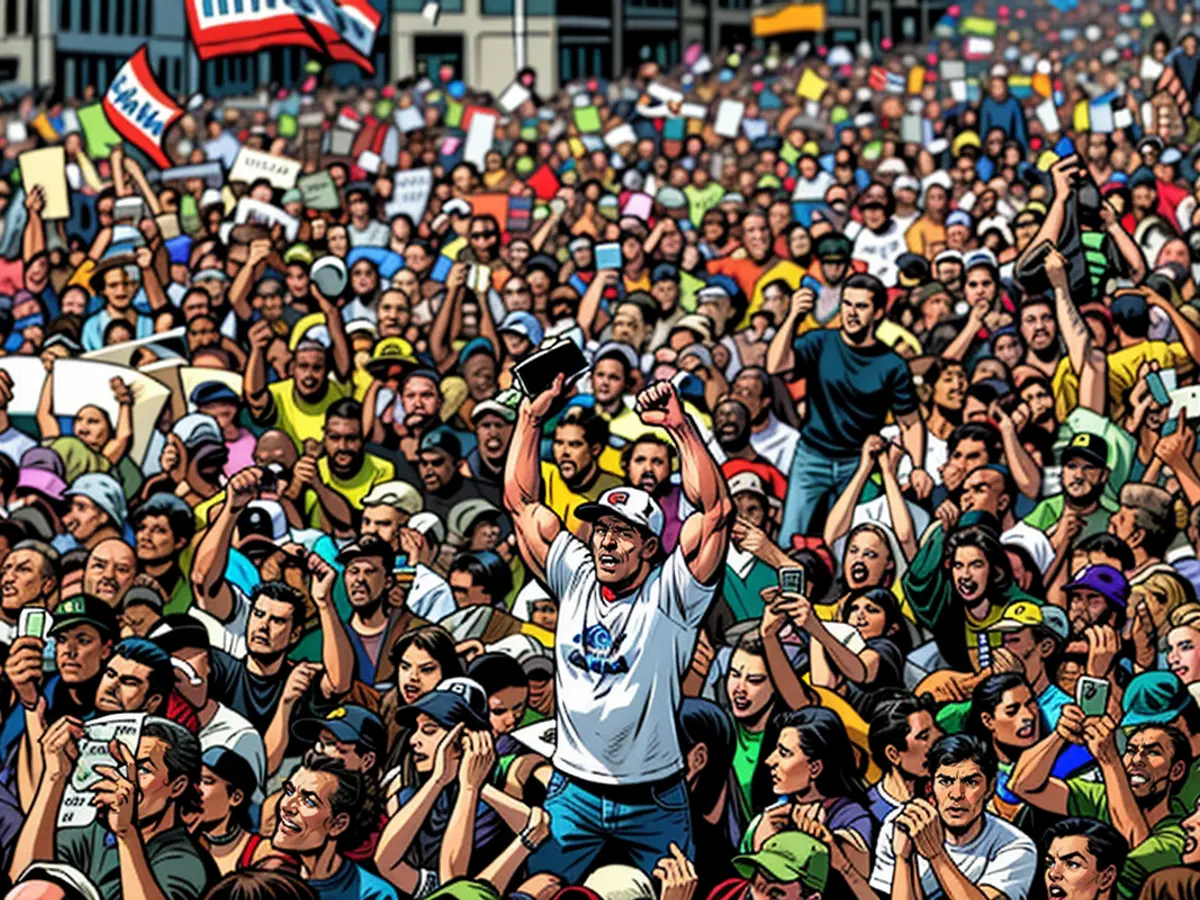- Venezuela's opposition increases pressure - military backs Maduro
After the controversial presidential election in Venezuela, the opposition continues to fight for a change of power and the withdrawal of authoritarian President Nicolás Maduro. He can still count on the support of the military, which has assured him of its loyalty. Thousands of government opponents took to the streets in the capital, Caracas, on Tuesday (local time) to protest against the official election results, which they believe were manipulated, declaring Maduro the winner.
The protesters chanted "We are not afraid" and cheered on their presidential candidate, Edmundo González Urrutia. So far, at least eleven people have died in the protests, according to independent organizations, and hundreds have been arrested, according to official figures.
Meanwhile, the armed forces, a significant power factor in the South American country, have pledged their support to Maduro. "We reaffirm the absolute loyalty and unconditional support for the citizen Nicolás Maduro Moros, the constitutional president of the Bolivarian Republic of Venezuela, our commander-in-chief (...)," said Defense Minister Vladimir Padrino López in a televised statement, surrounded by members of the general staff.
Maduro was re-elected in accordance with the law, Padrino added. However, the defense minister warned that the military would take "forceful" action if necessary to maintain order throughout the country, while upholding the constitution and human rights. "We are facing a coup d'état orchestrated by the fascist forces of the extreme right with the support of imperialist forces, the US imperialism," Padrino said. "We will thwart this coup."
In Caracas, opposition leader María Corina Machado called on her supporters from a stage to say that the true result of the election is clear and non-negotiable. "The only thing we are willing to negotiate is a peaceful transfer of power." The opposition claims to have access to over 80 percent of the detailed election results from individual voting districts, which the National Electoral Council has not yet published. According to these results, González would have received 67 percent of the votes, and Maduro 30 percent.
Given the tense situation and speculation that Machado and González could be arrested, the government of Costa Rica offered them and other politically persecuted people in Venezuela asylum. Machado thanked them but said she wanted to stay in her home country for now. "It is my responsibility to continue the fight alongside the people," she wrote on X.
After the presidential election on Sunday, the pro-government electoral authority declared Maduro the official winner. The opposition accuses the government of electoral fraud. The USA, the EU, and several Latin American countries also doubt the official election results. The Organization of American States does not recognize Maduro's re-election and has scheduled an emergency meeting of the Permanent Council on the situation in Venezuela for Wednesday.
Biden and Lula urge the publication of detailed election results.
In light of doubts surrounding the official election results, U.S. President Joe Biden and Brazilian President Luiz Inácio Lula da Silva called for transparency. They agreed that Venezuela's electoral board should publish detailed results from each polling station, the White House said after their phone call. They shared the assessment that the election's outcome is crucial for democracy far beyond Venezuela's borders.
At least 11 protesters, including two minors, have been killed in protests against the election results, according to the independent organization Foro Penal. A police officer was also killed, according to the Attorney General's Office.
A total of 749 protesters have been detained nationwide, Attorney General Tarek William Saab said. They are accused of attacking police stations, election offices, town halls, and hospitals, among other charges, including terrorism, incitement to hatred, and blocking public streets.
President Maduro announced a security operation involving soldiers and police patrolling the streets and confronting violent groups. He accused the opposition and the U.S. government of plotting a coup with armed groups. "The oligarchy cannot accept the election results," Maduro said. "But fascism will not prevail in Venezuela."
UN Human Rights Commissioner expresses concern
UN Human Rights Commissioner Volker Türk expressed concern about the violence in a statement. "I am concerned about reports of disproportionate use of force by security forces and armed groups supporting the government," Türk said. "I urge the government to respect the right of all Venezuelans to assemble, protest peacefully, and express their opinions freely and without fear."
Venezuela has been in a severe political and economic crisis for years. In the once-wealthy country with vast oil reserves, more than 80 percent of the population lives below the poverty line. Power outages are frequent, and gasoline, gas, and medicine are scarce. More than seven million people - a quarter of the population - have left Venezuela in the past decade due to poverty and violence.
Statement by Defense Minister Padrino via Twitter
Defense Minister Vladimir Padrino López, in a statement via Twitter, reiterated the military's support for President Nicolás Maduro, referring to him as the commander-in-chief of Venezuela. Joe Biden and Brazilian President Luiz Inácio Lula da Silva, expressing their concerns over the election results, urged Venezuela's electoral board to publish detailed results from each polling station, emphasizing its impact on democracy beyond Venezuela's borders.








